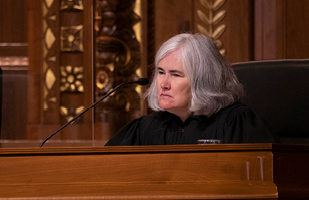Lifelong Learning Propels Appellate Judge

Judge Mary Eileen Kilbane last heard an oral argument for the Supreme Court in April 2014.

Judge Mary Eileen Kilbane last heard an oral argument for the Supreme Court in April 2014.
Eighth District Court of Appeals Judge Mary Eileen Kilbane’s lifelong passion as a scholar led to her latest learning experience as a visiting judge for the Supreme Court of Ohio.
“I was thrilled to be asked,” said Judge Kilbane, who has been serving the Eighth District since 2004.
Judge Kilbane’s original career path was to be an educator. Before considering law school, she earned her license to be a high school social studies teacher. The idea of continually learning about the law compelled her to become an attorney. Each assignment since – as a lawyer then a judge – has furthered her legal insight.
“I’m so fortunate that I get paid to work on, think about, and discuss cases with others,” said the judge.
The constants of learning and engaging with others are at the core of why teachers remain students. The opportunity to guide people through difficult circumstances is what drew Judge Kilbane to working with Cleveland and East Cleveland high school students. Through the Cleveland Metropolitan Bar Association program that focuses on the rights, responsibilities, and realities of area youth, Judge Kilbane is part of a group that’s reached more than 37,000 teens. The program’s purpose is to help young adults better understand and appreciate the U.S. Constitution and how to achieve goals beyond high school with the hopes of generating more diversity in the area’s legal ranks.
“A lot of these students have never met a lawyer or judge before. For those who did, it was often under not-so-friendly circumstances as a defendant,” said Judge Kilbane.
The idea of opening others minds while simultaneously opening her eyes to differing viewpoints is what drew Judge Kilbane to the bench. After advocating as an assistant public defender in Cuyahoga County for nine years, she was elected as a Cleveland municipal judge. It was there she realized how much trial courts, especially at the municipal level, can positively impact people who have committed low-level offenses, many times involving substance use.
“Most of these people are neighbors, and a lot of them have taken a bad turn, or had a regrettable moment,” said Judge Kilbane, “It’s really rewarding when you can help someone and see their progress.”
Learning about new subjects from people with different backgrounds – like drug or mental health court participants – has similarities to the judge’s work at the appellate level. There she’s also constantly learning the specifics of new cases and discussing the details with others – be it court staff, judges, or justices – to determine the fairest resolution. The case she heard for the Supreme Court – In re Establishing the Solar Generation Fund Rider – debates whether the Public Utilities Commission of Ohio is overcharging customers to support a “solar generation fund” to promote the use of solar power.
Judge Kilbane’s participation was due to Justice Jennifer Brunner’s recusal. The Ohio Constitution states that in the event of a justice’s recusal, the chief justice selects an appellate court judge to sit temporarily on the Supreme Court.
The “very orderly” deliberations of the case for the judge are like any big-picture conversation she has with others, be it with high school students or fellow jurists, where she enjoys the chance to share her insights while grasping a greater perspective from her research and from others.
“It’s real honor to serve this Court and I’m very grateful for it,” Judge Kilbane said.


